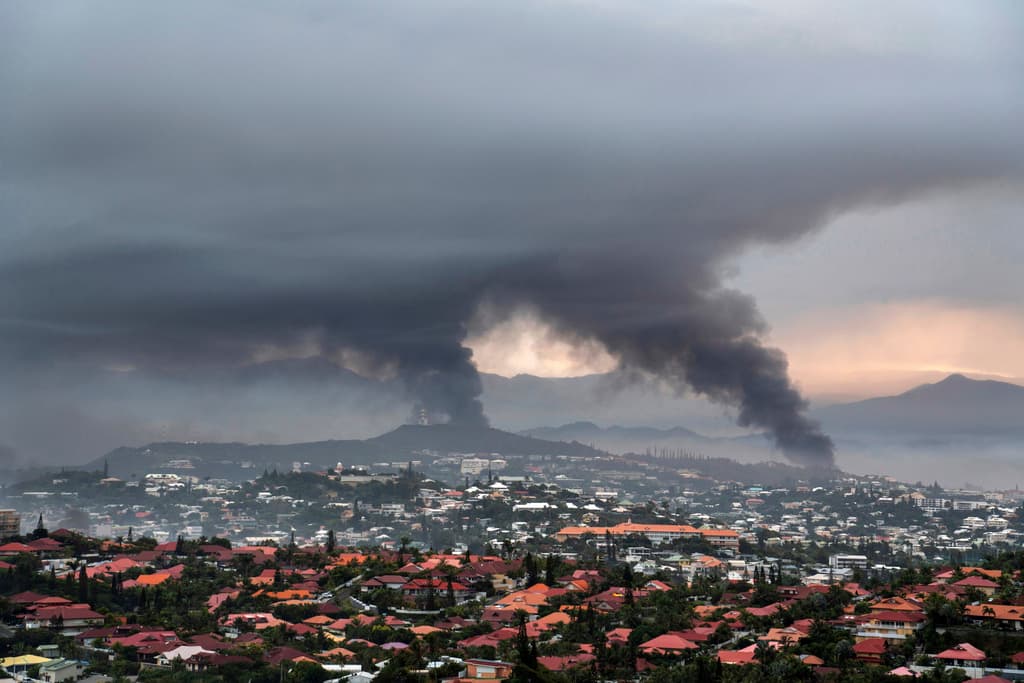Now at a Theater Near You, a Multi-Front War Is Underway Against the West
Unrest erupts in New Caledonia, as America and France are in a race to retreat.

The West, whether it realizes it or not, is engaged in a multi-front war. Iran and its proxies are setting the Middle East aflame, Russia advances in Ukraine, Communist China is waging gray-zone warfare against Free China, the Philippines, and Japan, with the risk of escalating into open conflict. Beyond these theaters, numerous fronts are being stoked by revisionist states. All aim to upend the global order.
The latest case is the ongoing unrest in the French Pacific island territory of New Caledonia, to which President Macron’s recent visit had all the hallmarks of a diplomatic Hail Mary pass. Paris and Washington, it seems, are in a nail-biter for global shame and retreat. In New Caledonia, anti-French separatists backed, curiously, by Azerbaijan, have been vying for self-rule. In the unrest, Baku has spotted an opportunity to strike against France.
The Azerbaijan capital of Baku has long resented Paris for its role in the Minsk Group and its historically pro-Armenian stance. Its president, Ilham Aliyev, has made support for separatists in France’s overseas territories a priority, especially as head of the Non-Aligned Movement, a role he held until January. In New Caledonia, Azerbaijani flags have been spotted among the separatists. Paris has also accused Baku of orchestrating anti-French disinformation campaigns.
Communist China, too, appears to be fanning the flames. Beijing has long been interested in New Caledonia, partly due to the island’s nickel — it has 25 percent of global deposits — and its strategic location. New Caledonia sits 930 miles east of Australia and 850 miles south of Solomon Islands, with which China in 2022 signed a security pact that could see its military bases there. An outpost in Nouméa would be a nice addition.
Especially should Beijing wish to block Australia from America. Though not as brazen as Azerbaijan, then, China has been subtly supporting New Caledonia’s independence movements. Its efforts have been channeled through its United Work Front Department, tasked with overseas influence operations, and via local proxies in the nickel industry. Were New Caledonia to go the way of, say, Niger, Beijing would be well placed to move in.
Such an escalation is telling, if not unsettling. That a nation as geopolitically modest as Azerbaijan should today feel so emboldened as to retaliate against France suggests a steady shift in the global balance of power. Indeed, with America in retreat under President Biden, Global South countries — supported by Communist China, Russia, and Iran — have grown fortified in opposition to the West.
Among the South Caucasus’s, Azerbaijan is China’s biggest trade partner. Last week, the countries vowed to “elevate” their ties to “new heights.” Their unity is forged, in part, by contempt for Western “imperialism.” Quelle surprise. The folly of the post-Cold War, ideologically glib and rapturous West was to assume the triumph of the so-called liberal international order and the unquestionable embrace of its norms and institutions.
That the Non-Aligned Movement remains relevant and appears to be extending its influence in the year 2024 should dispel such notions. Recent remarks by the International Criminal Court prosecutor, suggesting certain Global South members view the court as a vehicle for their anti-Western agenda, reinforces the point. They also hint at joint lawfare efforts to upend Western powers and structures. Consider the recent rulings against Israel.
Legal warfare is joined by political warfare, with tactics that span redrawn borders, information operations, migration, subsidized anti-Western protests, and tutelage for foreign police forces. Across the Pacific Islands and Africa, Beijing actively trains local security forces. The Wagner Group does so, too, in the Sahel, where it is fast expanding its reach, and in parts of the Middle East. It likely helped train Hamas before October 7.
The strategic focus of America and its allies has so far been on bolstering kinetic capabilities to counter China in the Pacific and Russia in Europe — and with good reason. Yet the war on the West is not solely kinetic. It is also not limited to a few theaters. It is unfolding across multiple domains and with the help of actors in regions long neglected by the West. It’s time to address this strategic reality and, with a dose of realism, adapt.

